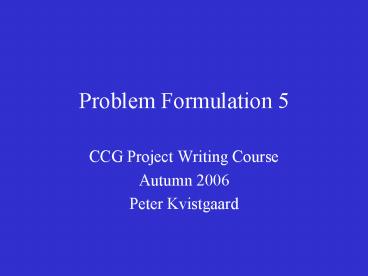Problem Formulation 5 - PowerPoint PPT Presentation
1 / 9
Title:
Problem Formulation 5
Description:
It is claimed that accumulation of new knowledge is important for at least two ... how can we address the right problems in the right way at the rigth time? ( process) ... – PowerPoint PPT presentation
Number of Views:21
Avg rating:3.0/5.0
Title: Problem Formulation 5
1
Problem Formulation 5
- CCG Project Writing Course
- Autumn 2006
- Peter Kvistgaard
2
Problems in regional tourism policy
- The ph.d. thesis is based on the observation that
there is a lack of in depth knowledge about
problem identification processes in regional
tourism policy. - It is claimed that accumulation of new knowledge
is important for at least two reasons 1. If we
dont know what problems there is, how can we
solve them? (content). 2. If we dont know who
defines the problems, how can we address the
right problems in the right way at the rigth
time? (process)
3
Problems in regional tourism policy
- There are two purposes
- An explorative/problem identifying purpose
- A comparative purpose
4
Problems in regional tourism policy
Case A Mecklenburg-Vorpommern, Germany
Comparison with specifica-tion of para-metres,
state-ment of findings, reflec-tions on what
knowledge can be extracted from the cases
Introductory theoretical formulation of precise
purpose and assump-tions/existing knowledge as
basis for the case studies
Case B Nova Scotis, Canada
Case C Northern Jut-land, Denmark
5
What is a case?
- An empirical investigation of concurrent
phenomena - Within the frames of the phenomena in case
- In which clear border lines between phenomena and
context do not always exist - And in which as big a number of data sources have
been used as possible
6
Problems in regional tourism policy
- How has regional tourism policy developed in the
period between 1990 and 2000 in the three case
regions? - What problems have been included in the regional
tourism policies? - What policy actors are active in the decision
making processes in the three regions?
7
Two assumptions
- It is assumed
- That the three tourism regions constituate
themselves as policy fields in which policy
actors can be placed in positions relative to
each other - That it is possible to establish connections
between problems and actors
8
Conclusion
- A sports event is defined in the introduction
thereby setting the scene for the reader to
understand the background for formulating the PF - contribute is the weak point in the PF as it is
not defined how contribute might be understood
and how it might be used in operationalising the
PF
9
Conclusion
- experience development is defined very nicely
by using a Norwegian theorist and his theory.
This theory is then cititizised and elaborated
later in the text. This gives an edge to the
whole project. - The how can also be considered weak, as the
project does not really point towards the future
concerning strategy etc.































